"
Pregnancy can be a time when you take tremendous pleasure in eating, not only because you may enjoy food more but also because you know that it is nourishing both you and your baby.”
Martha Rose and Jane L. Davis
We understand too much is being talked about what you must eat and what you must not, but it’s a fact that You can’t Ignore the Importance of Nutrition during Pregnancy. India is currently deflecting from the Joint Family System to a Nuclear Family system. And in personal space, there is so much going on that we unknowingly ignore dos and don’ts when it comes to nutrition during Pregnancy. Good Food is important, and what is even more essential is having excellent nutritious Food.
During pregnancy, the mother’s body changes, and requirements also increase. We have much nutritional advice given to mothers by elders and grandmothers, which is true. But Scientific reasons are needed to understand how nutrition plays an important role. It is crucial to consider your nutritional intake during pregnancy. Pregnancy is the one time in your life when you’re eating habits directly affect another person. So, what you eat does matter.
- Table of Content
- Importance of Nutritious Food during Pregnancy
- What should be the Basic Diet of a Pregnant Woman?
- Pregnancy Cravings are for Real.
- Your Fluid Intake Does Make a Difference.
- Folic Acid is highly beneficial during Pregnancy.
- Busted Few Myths Around Pregnancy.
- Count your Calories during Pregnancy
- Some Don't during Pregnancy
- Final Thoughts
Importance of Nutritious Food during Pregnancy
When you’re pregnant, nutrition is more important than ever. It would help if you had more of many vital nutrients than you did before pregnancy. Making healthy food choices will help you give your baby what they need to develop.
It will also help ensure that you and your baby gain the proper weight. The essential components to be focused during pregnancy are
- Having a Balanced Meal,
- Necessary Weight Gain per trimester, and
- Good Exercise Routine.
What should be the Basic Diet of a Pregnant Woman?
A pregnant woman requires approximately 300 extra calories daily for a healthy pregnancy. These calories should come from a balanced diet of protein, fruits, vegetables, and whole grains. A Pregnant woman should keep sugar and fats to a minimum. A healthy, well-balanced diet can also help reduce pregnancy symptoms, such as nausea and constipation.
It’s normal for a pregnant mother to gain weight — however, gaining too much or too little weight increases the risk of complications for you and your baby. A well-balanced diet is usually enough to meet your nutritional needs during pregnancy. However, some foods contain higher concentrations of certain nutrients which are a must during pregnancy. A healthy, balanced diet includes various nutritious foods from the five food groups. It’s also advisable to drink plenty of water to stay hydrated.
Your diet includes
- Diet Includes
- Wholegrains and cereals
- Vegetables and legumes/beans
- Lean meats and poultry, fish, eggs, tofu, nuts, and seeds, as well as legumes/beans
- Fruits
- Dairy foods including mostly reduced fat milk, buttermilk, curd, and cheese
Pregnancy Cravings are for Real.
Most of us have days when we eat well and days when our intake of ‘treat’ foods may be higher. Pregnancy cravings can also make this harder to manage, especially for oods high in sugar, salt, or fat. Some think that pregnancy food cravings are a sign of nutrient deficiencies in a pregnant mother’s diet; however, it is not. Pregnancy can also cause changes in a mother’s tastes, and foods once found appealing can take on a completely different flavour. Food aversions can develop during pregnancy due hormonal changes. And if you are suffering from morning sickness or severe vomiting during pregnancy, it is important to eat what you can at the time but should be healthy.
Your Fluid Intake Does Make a Difference.
Do's
Don'ts
You can take in enough fluids, including water, lemon water, coconut water, and soups.
Avoid all forms of alcohol.

The following foods are beneficial to your health and foetus development during pregnancy:
Vegetables: Carrots, sweet potatoes, pumpkin, spinach, cooked greens, tomatoes, and red sweet peppers (for vitamin A and potassium)
Fruits: Mangoes, prunes, bananas, apricots, oranges, and red or pink grapefruit (for potassium)
Dairy: Fat-free or low-fat curd, skim or 1% milk, soymilk (for calcium, potassium, vitamins A and D)
Grains: Whole grain fortified foods (for b complex vitamin, iron, and folic acid) Proteins: Dals, legumes, milk and milk products, nuts and seeds, lean meat, eggs.
Most health care providers or midwives will prescribe a prenatal supplement before conception or shortly afterward to ensure your nutritional needs. However, a prenatal supplement does not replace a healthy diet.
It would be best if you have more folic acid, iron, calcium, and vitamin D than you did before pregnancy.
Folic Acid is highly beneficial during Pregnancy.
Folic acid is a B vitamin that may help prevent specific congenital disabilities. Before pregnancy, you need 400 mcg (micrograms) per day. You need 600 mcg daily from foods or vitamins during pregnancy and breastfeeding. It is hard to get this amount from foods alone, so you must take a folic acid supplement.
Folic acid is a nutrient usually found in:
- Some green leafy vegetables
- Most berries, nuts, beans, citrus fruits, and fortified breakfast cereals
- Some vitamin supplements.
Folic acid can help reduce the risk of neural tube defects and brain and spinal cord congenital disabilities. Neural tube defects can lead to varying paralysis, incontinence, and sometimes intellectual disability.
Folic acid is the most helpful during the first 28 days after conception when most neural tube defects occur. Unfortunately, you may not realize that you are pregnant before 28 days. Therefore, your intake of folic acid should begin before conception and continue throughout your pregnancy.
Your health care provider or midwife will recommend the appropriate amount of folic acid to meet your individual needs. Some of them are listed below:
1. Iron
Iron is essential for your baby’s growth and brain development. During pregnancy, the blood in your body increases, so you need more iron for yourself and your growing baby. You should get 27 mg (milligrams) of iron a day.
2. Calcium
Calcium during pregnancy can reduce your risk of preeclampsia, a severe medical condition that causes a sudden increase in blood pressure. Calcium also builds up your baby’s bones and teeth. Food sources of calcium are – ragi, sesame seeds, milk, and milk products.
3. Vitamin D
Vitamin D helps the calcium to build up the baby’s bones and teeth. All women, pregnant or not, should be getting 600 IU (international units) of vitamin D per day. Only take vitamins and mineral supplements that your health care provider recommends. Keep in mind that taking too much of a supplement can be harmful. For example, very high levels of vitamin A can cause congenital disabilities.
Busted Few Myths Around Pregnancy.
Myths
Facts

Myths
Facts

Gaining less weight during pregnancy will make delivery easier.
Mothers who do not gain enough weight during pregnancy place their babies at risk for severe complications such as premature birth, which can cause lung and heart problems.

A healthy pregnancy includes fat storage. Your body uses this excess fat as energy during labor and breastfeeding.
Pregnant women only crave the foods their bodies need.

Gaining less weight during pregnancy will make delivery easier.
Pregnant women can crave foods of any type. Cravings should not be the sole indicator of nutritional needs.

A healthy pregnant woman will not experience any discomfort during pregnancy.
Nausea, heartburn, and constipation are not biased! They will afflict women regardless of healthy living. However, women who eat healthy foods, drink plenty of water, exercise regularly, and avoid excess sugar and fat may significantly reduce these uncomfortable symptoms.
Myth: Gaining less weight during pregnancy will make delivery easier.
Fact: Mothers who do not gain enough weight during pregnancy place their babies at risk for severe complications such as premature birth, which can cause lung and heart problems.
Myth: If you gain the right amount of weight during pregnancy, none of it will be fat gain.
Fact: A healthy pregnancy includes fat storage. Your body uses this excess fat as energy during labor and breastfeeding.
Myth: Pregnant women only crave the foods their bodies need.
Fact: Pregnant women can crave foods of any type. Cravings should not be the sole indicator of nutritional needs.
Myth: A healthy pregnant woman will not experience any discomfort during pregnancy.
Fact: Nausea, heartburn, and constipation are not biased! They will afflict women regardless of healthy living. However, women who eat healthy foods, drink plenty of water, exercise regularly, and avoid excess sugar and fat may significantly reduce these uncomfortable symptoms.
Count your Calories during Pregnancy
How many calories you need depends on your weight before pregnancy, your age, and how fast you gain weight. The general recommendations are:
- In the first trimester of pregnancy, you probably do not need extra calories
- In the second trimester, you usually need about 340 extra calories
- In the last trimester, you may need around 450 extra calories per day
- During the final weeks of pregnancy, you may not need extra calories
Keep in mind that not all calories are equal. You should eat healthy foods packed with nutrients – not “empty calories,” such as Maida (or white flour) and bakery products, oily deep-fried foods, and carbonated sugary beverages.
Remember! Excess weight during pregnancy is associated with several- pregnancy and childbirth complications, including
- High blood pressure
- Preeclampsia
- Preterm birth
- Gestational diabetes
Even Obesity during pregnancy also increases the risk of:
- A larger than normal foetus (macrosomia)
- Birth injury
- Caesarean birth
- Congenital disabilities, especially NTDs

Some Don’t during Pregnancy:
1. Wash your fruits and Vegetables
Rinse all raw produce thoroughly under running tap water before eating, cutting, or cooking.
2. Clean
After handling and preparing uncooked foods, wash your hands, knives, countertops, and cutting boards.
3. Cook
Cook beef, pork, or poultry to a safe internal temperature verified by a food thermometer.
4. Chill
Promptly refrigerate all perishable Food. Always take help from professionals since it is very much required during pregnancy to have appropriate guidance.
Final Thoughts
Nutrition during pregnancy is of utmost importance. A healthy pregnancy diet is essential for both mother and baby, as what a woman eats and drinks during pregnancy is her baby’s primary source of nourishment. The mother’s body undergoes many physical and hormonal changes during pregnancy. To fuel the mother and the growing baby, the mother needs to make great food choices from various sources. Eating a healthy, balanced diet will help the mother feel good and provide everything you and your baby need. The Food you eat is your baby’s primary source of nourishment, so it’s critical to get all the nutrients you need.
Your body has increased nutritional needs during pregnancy. Although the myth of “eating for two” isn’t entirely correct, you require more micronutrients and macronutrients to support you and your baby. Macronutrients are nutrients that provide calories or energy. You require micronutrients in relatively small amounts with dietary components, such as vitamins and minerals. We take carbohydrates, proteins, and fats. But you’ll also need to eat more of each type of nutrient during pregnancy.

Harakh Baxi

I’m a Clinical Dietitian, Consulting Nutritionist and Diabetes Educator. Founder of ‘Lettuce Eat with Harakh’. I’m a visiting consulting Nutritionist at a Diabetes centre and a heart disease centre. My main motto is to educate people regarding the importance of food. Starving and not eating for weight loss is the most easy and famous way. But it always comes with a price. So what i suggest my clients is to eat good and then lose weight or manage weight. Creating lifestyle changes and not temporary fixes is important.





Your article helped me a lot, thanks for the information. I also like your blog theme, can you tell me how you did it?
I have read your article carefully and I agree with you very much. This has provided a great help for my thesis writing, and I will seriously improve it. However, I don’t know much about a certain place. Can you help me?